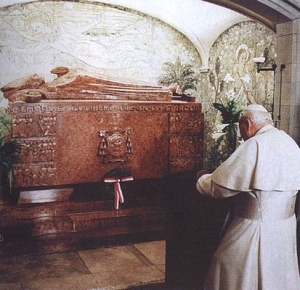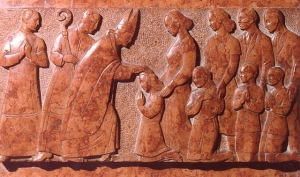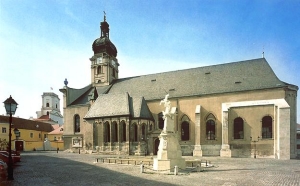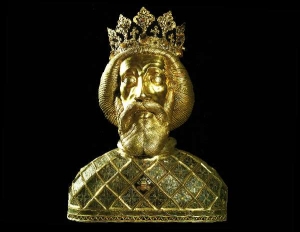Map
| Hotels
| Sights
| Wellness, Spa
| Travel Services
| Business Travel
| Programs
in Győr:
Hotel - Sight - Wellness, Spa - Travel Service - Business Travel - Program
|
Other information:
The Episcopate of Győr was founded by King St. Stephen in the first decade of his reign (1000-1009). The foundations of the basilica of Győr were also built during his rule. According to the records a three-nave church with a high altar stood here at the end of the 19th century. The first towers were built during the period of bishop Omodé (1257-1267). At the end of the 14th century bishop János Hédervári (1386-1415) had a Gothic chapel built at the southern part of the church, where you can see St. Ladislaus'herm and the blessed bishop Apor Vilmos' tomb.
St. Ladislaus' herm: Apart from the Holy Crown and the Holy Right Hand it is the most significant sacral relic of Hungary. In 1192, when St. Ladislaus was canonized, the bone relics were taken out of the tomb in Nagyvárad and the saint king's skull was first placed in a simple shrine and later in the herm and it was preserved in the cathedral of Nagyvárad. The enamelled front of the herm is the first known relic of the decorated enamel art, which later became widespread all over Europe. The herm is considered to be the most beautiful goldsmith's masterpiece of Europe, with the only authentic representation of the king from the House of the Árpáds. The holy relic was brought to Győr by Transylvanian bishop Demeter Náprági, when he became the chief pastor of Győr in 1607. Every year on 27 June a ceremonial procession is held with the saint king's herm.
Blessed Bishop Apor Vilmos' Tomb: Vilmos Apor was born on 29 February 1892 in a Szekel noble family, he was ordained priest in 1915. First he was a chaplain, then a military priest and from 1918 he was a parson in Gyula. He was a socially very sensitive pastor. On 2 March 1941 he was appointed bishop of Győr. During World War II he protested against violence and the persecutions. On 2 April 1945 he was shot dead by Russian soldiers, while he was protecting the women and the girls who escaped to the Püspökvár. On 9 November 1997 the martyr bishop was declared blessed by Pope John Paul II.
St. Ladislaus' herm: Apart from the Holy Crown and the Holy Right Hand it is the most significant sacral relic of Hungary. In 1192, when St. Ladislaus was canonized, the bone relics were taken out of the tomb in Nagyvárad and the saint king's skull was first placed in a simple shrine and later in the herm and it was preserved in the cathedral of Nagyvárad. The enamelled front of the herm is the first known relic of the decorated enamel art, which later became widespread all over Europe. The herm is considered to be the most beautiful goldsmith's masterpiece of Europe, with the only authentic representation of the king from the House of the Árpáds. The holy relic was brought to Győr by Transylvanian bishop Demeter Náprági, when he became the chief pastor of Győr in 1607. Every year on 27 June a ceremonial procession is held with the saint king's herm.
Blessed Bishop Apor Vilmos' Tomb: Vilmos Apor was born on 29 February 1892 in a Szekel noble family, he was ordained priest in 1915. First he was a chaplain, then a military priest and from 1918 he was a parson in Gyula. He was a socially very sensitive pastor. On 2 March 1941 he was appointed bishop of Győr. During World War II he protested against violence and the persecutions. On 2 April 1945 he was shot dead by Russian soldiers, while he was protecting the women and the girls who escaped to the Püspökvár. On 9 November 1997 the martyr bishop was declared blessed by Pope John Paul II.
|
|
Püspöki Székesegyház - Hungary - Győr (Sight: Sight) |
Püspöki Székesegyház - Ungarn - Győr (Sehenswürdigkeit: Sehenswürdigkeit) |
|
|
||
|
Saturday, 26. April 2025. - 09:32:50 |
||





